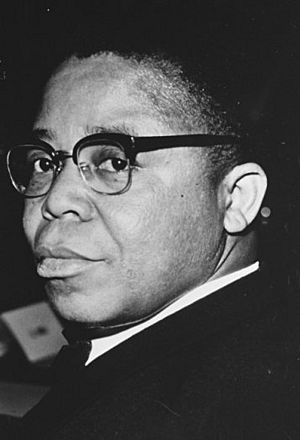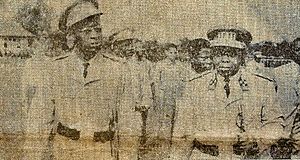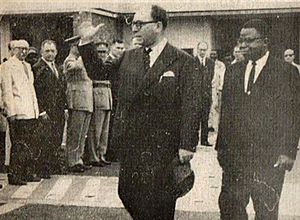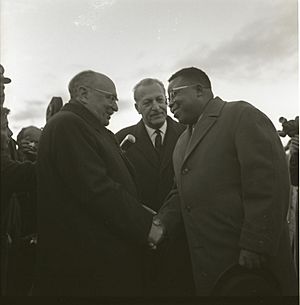Joseph Kasa-Vubu facts for kids
Quick facts for kids
Joseph Kasa-Vubu
|
|
|---|---|

Kasa-Vubu at the Belgo-Congolese Round Table Conference, January 1960
|
|
| 1st President of the Republic of the Congo | |
| In office 27 June 1960 – 24 November 1965 |
|
| Prime Minister | Patrice Lumumba Joseph Iléo Justin Marie Bomboko Joseph Iléo Cyrille Adoula Moise Tshombe Évariste Kimba |
| Preceded by | Position established |
| Succeeded by | Joseph-Désiré Mobutu |
| Personal details | |
| Born | c. 1915 Kuma-Dizi, Mayombe, Belgian Congo |
| Died | 24 March 1969 (aged 53–54) Boma, Democratic Republic of the Congo |
| Political party | ABAKO |
| Spouse | Hortense Ngoma Masunda (m. 1941) |
| Children | 9, including Justine Kasa-Vubu |
Joseph Kasa-Vubu (around 1915 – 24 March 1969) was an important politician from the Congo. He became the very first President of the Democratic Republic of the Congo (then called the Republic of the Congo) in 1960. He served as president until 1965.
Kasa-Vubu was a member of the Kongo people. In the 1950s, he became the leader of a political group called Alliance des Bakongo (ABAKO). He quickly became a strong voice for Congo's independence from Belgian rule. After Congo became independent in 1960, he became president. He worked with Patrice Lumumba, who was the prime minister.
Soon after independence, their government faced many challenges. This time was known as the Congo Crisis. There were groups trying to break away and other rebellions. Kasa-Vubu, who preferred a balanced approach, disagreed with Lumumba, who was more left-leaning. Lumumba asked for help from the Soviet Union. This caused a big disagreement between them. Kasa-Vubu then removed Lumumba's government. He said they had communist ideas. After Lumumba's death in 1961, Kasa-Vubu led several weak governments. He also dealt with more rebellions from Lumumba's supporters. In 1965, he was removed from power by Joseph-Désiré Mobutu. Kasa-Vubu died four years later.
Contents
Early Life and Education
Joseph Kasa-Vubu was born in a village called Kuma-Dizi. This village is in the Mayombe area of the Bas-Congo region in western Belgian Congo. He was born around 1915. He was the eighth of nine children. His family belonged to the Yombe people, who are part of the larger Kongo people. His father was a successful farmer. He traded with merchants and built his own house.
The word "Kasa" was added to his name. This was after his father volunteered for a special test. On January 31, 1925, Joseph was baptized as a Christian. This happened at a Catholic mission near Tshela.
In 1927, Kasa-Vubu started primary school. The next year, he moved to a special school in Mbata-Kiela. There, he finished primary school. He also began studying Latin and other subjects. He was preparing to become a priest. Kasa-Vubu was a very hard-working student. In 1936, he finished second in his class. He was accepted into a seminary in Kasai Province. He planned to study for many years to become a priest. However, he was asked to leave the seminary in 1939.
Kasa-Vubu then went back to Mayombe. He found a job as a bookkeeper for a mission. He was not happy with his low pay. In 1941, he became a teacher at the mission school. But his pay did not increase. So, he left the mission. In May, he found a new job at an agriculture company. With better pay, he felt ready to get married. On October 10, he married Hortense Ngoma Masunda. They had nine children together.
In 1942, Kasa-Vubu got a job as a clerk. He worked for the Belgian government in Léopoldville. This was the capital of the Congo. He worked there for 15 years. He reached the highest position a Congolese person could have. By 1956, he was in charge of accounting for all government stores.
Starting Political Activities
While working for the Belgian government, Kasa-Vubu also started doing political work. This work was often kept secret.
In 1954, Kasa-Vubu was chosen as the president of the Alliance des Bakongo (ABAKO). This group won many votes in the first local elections in Léopoldville in 1957. Kasa-Vubu was elected mayor of the Dendale district in the city.
Kasa-Vubu quickly became known for asking for Congo's independence. At first, he suggested independence in 30 years. But as the ABAKO movement grew stronger, he wanted it sooner. In his speech as mayor, Kasa-Vubu repeated his demand for independence. The Belgian authorities were not happy. But this only made him more popular as a Congolese leader.
On January 4, 1959, ABAKO planned a political meeting. Kasa-Vubu was supposed to speak about African nationalism. But the Belgian authorities banned the meeting. They could not control the crowd. Thousands of Congolese people started rioting. Kasa-Vubu and other leaders were arrested. They were put in prison for causing the riot. He was released two months later. These events, known as the Léopoldville riots, were a key moment for Congo's independence.
Presidency
When Congo became independent from Belgium, ABAKO won many votes. But they did not win enough to rule alone. So, they made a deal. Patrice Lumumba would be prime minister. Kasa-Vubu would become president. People were happy with Kasa-Vubu's election. The Belgian newspapers reacted well. A local newspaper in Léopoldville also approved. People around the world were satisfied. They felt the new leaders had a good balance. Belgian politicians hoped Kasa-Vubu would control Lumumba. Kasa-Vubu officially became president on June 27.
The new country immediately faced problems. There were political and military conflicts. Some regions wanted to break away. The central government was stuck. Kasa-Vubu was more conservative. Prime Minister Lumumba was more left-leaning. Lumumba wanted a strong central government. Kasa-Vubu wanted provinces to have more power. He preferred a federal system.
Kasa-Vubu was often quiet about his plans. He sometimes gave unclear answers. His job as head of state was mostly ceremonial. It was less powerful than Lumumba's job as prime minister. After independence, Kasa-Vubu did not do much right away. Lumumba asked for help from other countries. Kasa-Vubu faced criticism. People thought he should stop Lumumba's strong actions. But Kasa-Vubu resisted this pressure. On August 13, he asked everyone to unite and support the government.

On September 5, Kasa-Vubu removed Lumumba's government. He said they had communist ideas. Lumumba did not accept this. He announced that Kasa-Vubu was also removed. This caused a big standoff. On September 14, the army commander, Joseph-Désiré Mobutu, took control. He arrested Lumumba. Lumumba later died in the Katanga region.
For the next five years, Kasa-Vubu led several weak governments. After the Katanga region stopped trying to break away, Kasa-Vubu appointed Moïse Tshombe as prime minister in July 1964. Tshombe's job was to end a new rebellion called the Simba Rebellion. Tshombe brought back soldiers from Katanga. He also hired white soldiers from other countries. These soldiers joined the Congolese army. Many of them had fought for Katanga before. Tshombe had success against the rebels. But using foreign soldiers hurt his reputation. Kasa-Vubu lost trust in him. In October 1965, Kasa-Vubu removed Tshombe as prime minister.
Mobutu took power again on November 25, 1965. This time, he removed Kasa-Vubu. Mobutu then declared himself the new head of state.
Later Life and Death
Mobutu placed Kasa-Vubu under house arrest. Later, he allowed Kasa-Vubu to live on his farm in Mayombe. Kasa-Vubu died in a hospital in Boma in 1969. He was possibly sick for a long time.
Legacy
After his death, Kasa-Vubu's family moved away. They lived in Algeria and then Switzerland. One of his daughters, Justine M'Poyo Kasa-Vubu, returned to the Congo in the 1990s. In 1997, she became a government minister. She then became an ambassador to Belgium. A statue of Kasa-Vubu's face was placed on his tomb in 2002. His supporters had asked for this.
Joseph Kasa-Vubu's role in Congo's history is sometimes less known. People often focus more on Lumumba and Mobutu. However, some experts say that Kasa-Vubu and ABAKO were a main driving force. They helped lead the movement for Congo's independence.
Honours
- Grand Cordon in the Order of Leopold, given by King Baudouin on June 30, 1960.
- Recognized as a National Hero of the Democratic Republic of Congo on June 30, 2020.
See also
 In Spanish: Joseph Kasa-Vubu para niños
In Spanish: Joseph Kasa-Vubu para niños
 | Charles R. Drew |
 | Benjamin Banneker |
 | Jane C. Wright |
 | Roger Arliner Young |



